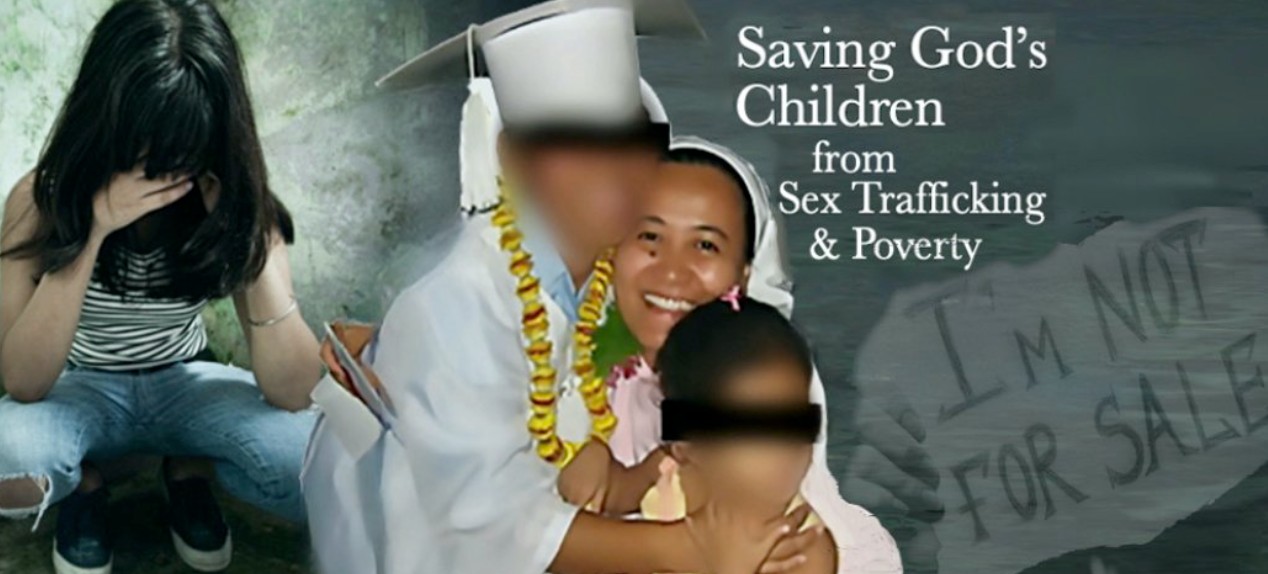Religious sisters rescuing girls from sexual slavery in Cebu
Sister Corazon J. Salazar, foundress of the Mary Queen of Heaven Missionaries (MQHM), heads the institute. Its 16 members travel to remote areas and rural villages to fight trafficking, rescue girls from prostitution, offer education, and help them find work. Extreme poverty favours exploitation.
Manila (AsiaNews) – A group of Filipinas got together in 1996 to save young women and girls from sexual slavery, prostitution, human trafficking, and poverty in Cebu, Central Visayas. Through such a mission, they chose to bear witness to Christ and contribute to the development of Philippine society.
Their leader, Sister Corazon J. Salazar, ran a business which she gave up to embrace the consecrated life and found a religious institute, the Mary Queen of Heaven Missionaries (MQHM), along with six other religious sisters.
In 2000, the late Card Ricardo J. Vidal, then archbishop of Cebu, recognised the group of Sisters as a Catholic Association of the Faithful in the Archdiocese of Cebu, canonically elevating them to a Public Association of the Faithful on 22 August 2003, the solemnity of the Queenship of the Blessed Virgin Mary.
The MQHM currently has 16 members, who travel to remote areas and country villages with the help of lay people, priests, and members of local communities, to bring help to needy children and provide them with education, opportunities for redemption, and trust in God and their neighbours.
The Philippines, like the rest of Southeast Asia, ranks high in terms of sexual exploitation of women and girls; its extreme poverty helps the most vulnerable fall victim to trafficking, particularly in rural areas.
According to Sister Corazon, poverty and neglect drive young women, teenage girls, and children, some as young as eight, into the sex trade, where they are exploited and in some cases even killed.
The Sisters use a two-pronged approach. First, they try to free the girls from slavery; this is followed by the attempt to provide them with an education and training so that they can reintegrate society through employment which allows them to live in dignity.
Seen as “angels of mercy”, the Sisters walk at night in the dark alleys of red-light areas looking for girls in need.
“We rescue girls and victims of sex trafficking who are into prostitution,” Sister Corazon explains. “Minors wait for customers for a tiny payment to help supplement their family's subsistence,” she adds.
The poorest of the poor fall prey to handlers who prowl desolate rural regions, promising parents "good jobs in the city" for their girls, as bar dancers and tourist escorts.
The rehabilitation programme the Sisters have developed to meet the needs of the girls who are looking desperately for a way out has two parts.
The first part is the Home of Love, a centre devoted to rehabilitation and livelihood skills training in Bagasawe, Tuburan, Cebu.
The facility offers shelter, food, healthcare, psychological counselling, spiritual support, vocational training (such as candle making, scapular and rosary making), as well as childcare for young women with children.
The second part is the Regina Coeli education programme, which provides free schooling with 550 families signed up. It offers education to the underprivileged as a way to stop the growth of the sex trade.
In their latest action, the Sisters rescued three sisters, aged 14 to 17, who were abused by family members and abandoned by their mother.
07/02/2023 12:11
07/02/2019 17:28
03/07/2024 14:23







.png)










